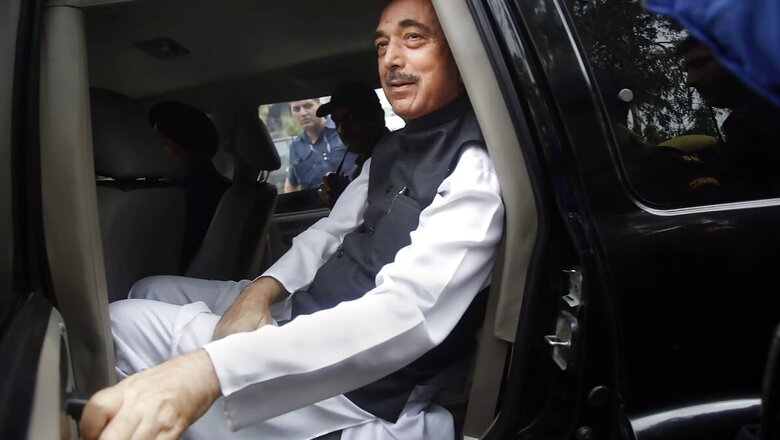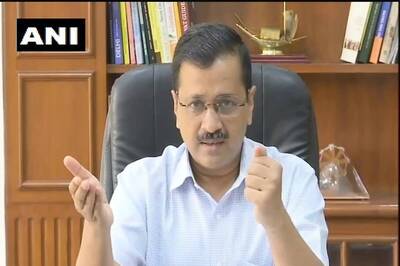
views
The first thing that strikes you when you enter Ghulam Nabi Azad’s residence in Delhi is a huge poster of Rajiv Gandhi and Indira Gandhi. He considers them his mentors and is also proud of the fact that he has worked with all the Gandhis, from Indira to Rahul.
Reporters on the Congress beat for a long time now recall seeing this tall, thin man pacing up and down the sprawling lawns of the AICC headquarters in Delhi. Occasionally, he would break away from the crowd thronging him to put an arm around a party worker or leader, cajoling them to work and stay with the party.
Today, Azad could do with some cajoling himself, though he says Rahul Gandhi called him twice — once during the stormy CWC and then again later. What has surprised many is that Azad, a party veteran and loyalist who spent several terms in jail, signed the dissent letter so Sonia Gandhi, demanding sweeping changes.
He is today being referred to as the “letter writer” and part of the core team of the group of 23 signatories.
Sounding caution, Azad has said, “The situation the party is in today, we won’t win in another 50 years. We have not questioned the Gandhis or the leadership, but we need to have elections. There has to be a full-time leadership. Also, unless you hold elections to PCCs and blocks, there would be no strengthening of the organisation.”
It was this point which was raised by Azad along with other signatories. But the CWC was reduced to a discussion on the timing and leak of the letter. And this is what has upset and hurt many of the signatories, including Azad.
As organisation secretary and general secretary for many states and having manged state leaders, Azad knows that internal elections ensure acceptability and accountability. In a deeply divided party like the Congress, appointments by central leadership usually end up dividing state cadre instead of placating and uniting them.
This was evident in the infighting in states like Gujarat, UP, Bengal, Tamil Nadu and many others as centrally appointed chiefs are not acceptable to all. Elections to the top posts, according to Azad and others, would ensure that a dissenting loser would fall in line if everyone works together. Sources say Azad was equally upset when some members attacked him.
Ambika Soni, his bete noir for years, asked him: “I lost my house but your car hasn’t even seen a scratch and the flag is intact.”
The insinuation was that he was close to the ruling BJP. A fuming Azad retorted that if anyone proved the allegations against him, he would resign.
Rahul Gandhi rushed to placate him and phoned him just after he called Kapil Sibal. Azad even said: “To be fair, the Gandhis were nice to me at the CWC. Mrs Gandhi ended the meeting on a positive note saying that we all should move on and work together.”
Azad stands today at a point where he doesn’t know which side of his bread is buttered. There is an interesting anecdote which shows how he moved and worked his way up the ladder. In 1979, the AICC headquarters on 24 Akbar Road, housed both the main organisation as well as the Youth Congress.
Azad at the time was in the Youth Congress. There were no computers, but just one typewriter to be shared with the main organisation. His turn to use it would come at night when all the work was over. His work would begin at 1am and continue till morning.
For a year, he stayed in an office opposite Indira Gandhi’s at the AICC. He would store some bread and butter in his office; that was his meal. On a good day, Azad would cook rice, dal and meat. It’s this dedication for which Indira Gandhi rewarded Azad, making one of the trusted lieutenants of the Gandhis.
Until this letter.
The two changes Sonia Gandhi has made skips the main committee on ordinance and the one on strategy. By virtue of being Leader of the House, Azad continues to be on one of them. But does he feel bad or snubbed? “Not at all. Some within the party are getting it wrong. These changes and appointments were recommended by me. I have full faith in the Gandhis. It’s my party and I want it to do well. I only raised some issues. I am happy now that our demands have been accepted. There will be elections for the president post in six months and the rest of organisational elections will take place over the next one year.”
Azad dismisses talk of being miffed at being left out in the new changing Congress. “They don’t know who Azad is and they don’t know my association with the party for years,” he says.
There are many in Jammu-Kashmir who suggest that given the political vacuum and anger with mainstream parties like the Congress, National Congress and PDP, Azad could be working with “like-minded” people and leaders to carve out a place for himself in the state should nothing work out at the Centre. But there is no confirmation nor comment on this.
For the man who lived on butter toast for over a year in a small room in the AICC in the 1970s, the fight is beyond just front-row seat as the leader of opposition in Rajya Sabha. It’s a fight for his yezatth (Kashmiri for self-respect).




















Comments
0 comment